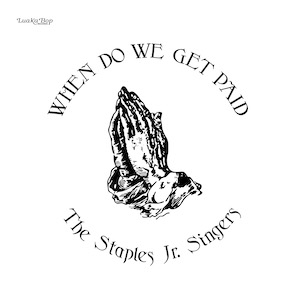
Staples Jr. Singers – When Do We Get Paid
Luaka Bop – 6 May 2022
There are moments when you hear something, and you can instantly feel your hair stand up on end; there’s a realisation that you are hearing something extraordinary. When Do We Get Paid by Staples Jr. Singers has that effect from the first guitar notes of the album opener “Get On Board”, while their story leaves you stunned.
A family of musicians from Aberdeen, Mississippi, A.R.C. Brown, and his sister Annie and brother Edward began singing in the early 70s, first playing school talent shows, front lawns and local churches, later travelling across the Bible Belt in the family van as their reputation grew. The desegregated (yet still largely segregated) South wasn’t always friendly to blacks; the family was never sure what kind of reception they would receive. However, when they sang, sparks flew. In 1975 they came across Joe Orr, a travelling gospel singer who introduced them to Big John, the owner of a recording studio in Tupelo. The album they recorded, When Do We Get Paid, never saw a mass release or virtually any kind of a release. Mostly it was sold from the trunk of their car.
Within the grooves of the record were the blood, sweat and tears of a band surrounded by a world that didn’t make sense. A world dealing with the backlash to desegregation, the reality of poverty and the quest for civil rights that had been going on for over 100 years. When the Staples Jr. Singers tell you, “You got to get on board”, there’s a sense that you don’t want to waste your chances.
The intensity that Annie puts into her vocals on “I Know You’re Going to Miss Me” makes it clear that you’re putting everything at risk. When she sings, “I want to go with ya,” the power and soul in her voice are simply overwhelming. There’s a fire burning inside her, and it can’t be put out. The instrumentation, guitar, bass, drums with the occasional organ couldn’t be more basic, but they’re derived from a place of virtually perfect purity.
The groove behind “When Do We Get Paid” is a slow shuffle, but the sentiment that Edward puts into the lyrics are filled with frustration, “When do we get paid for the work we done?” The frustration gets laid out by Edward while Annie fills in the chorus. When he adds, “Bring home the money sometimes,” you can feel the weariness that comes from feeling that it may never happen.
You don’t have to be religious to feel the spirit that imbues these songs. The Staples Jr. Singers have put it in every groove of the original record. When Do We Get Paid outlines the long road we all walk down before we reach the promised land. Instead of being filled with frustration, the Staples Jr. Singers still have hope, which is what makes their message so powerful.
When Do We Get Paid is released on Luaka Bop (6th May). Pre-order here: https://luakabop.lnk.to/StaplesJrSingers
